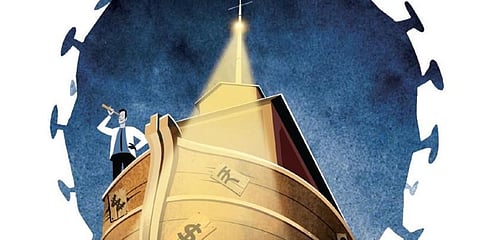

As we approach the dubious milestone of 1,00,000 deaths, Pope Francis from the Vatican sent out an important message. He likened the coronavirus pandemic to the recent fires and floods, nature unleashing a kind of apocalypse on a defiant world that had ignored climate change and the building ecological crisis. After things calm down, and we have finished counting our dead, there will be a new world we won’t recognise. Lehman Brothers and the financial crash of 2008 will pale into insignificance. In India, the toll that hunger and joblessness will claim will be far higher than Covid-19.
We can then either recognise our failures and correct our course to a more sustainable path of sharing our global resources equitably, leaving space for nature and the rest of the animal kingdom; Or we can treat the pandemic as an aberration and go about our business with the usual avarice and gluttony that has marked our last five decades of growth.
Pope Francis, in his interview published last Wednesday with two Catholic magazines, the Tablet and the Commonweal, asked: “Who now speaks of the fires in Australia, or remembers that 18 months ago a boat could cross the North Pole because the glaciers had all melted?” And then his reply: “I don’t know if these are the revenge of nature, but they are certainly nature’s responses.” The pontiff ’s message is clear: the widespread destruction of lives and the economy now offers us an opportunity to slow down the rate of production and consumption; and to learn to understand the natural world.
Manipulating nature
Echoing the pope in a more specific analysis, environmental writer and activist Vandana Shiva, in an article pointed out: “As we invade forest ecosystems, destroy the homes of species and manipulate plants and animals for profits, we create conditions for new diseases. “Over the past 50 years, 300 new pathogens have emerged. It is well-documented that around 70 per cent of the human pathogens, including HIV, Ebola, influenza, MERS and SARS, emerge when forest ecosystems are invaded and viruses jump from animals to humans.”
Some big pandemics have triggered huge change in the course of history. Black Death, or the bubonic plague in Europe in the 1340s, wiped out one-third of entire communities. The economy then was based on local agriculture and crafts, and made a comeback quickly. In a strange boomerang effect, those who survived got more bargaining power as working people. It lead to the growth of the ideology of liberty and triggered peasant revolts that laid the basis for the downfall of feudalism and the rise of capitalism in Europe.
Crippled economy
Mercifully, the coronavirus pandemic is tapering off; but its crippling economic impact may have never seen before. In fact, the question being asked is: will capitalism as we know it, survive? Today the economic system is made of complex financial mechanisms; and if a single domino falls, the entire system is under threat. Much of the financial system is built on bundles of IOUs, based on expectations of payment in the future. When these collapse, the foundations collapse. Despite all the ‘nationalism’, in production and manufacturing it is a global village of complex supply chains. For buying intermediate electronic products, the world looks to Guangdong province in China, and to Foxtel in Taiwan; if it is ready-made textiles, it is Bangladesh.
If the supply chain fails at any point, there is collapse down the line. What we are hurtling into is the deepest slump in consumer spending, the worst recession we will possibly live through. Governments, to shore up the crisis, have launched never-before-seen rescue packages, such as the US package of $2 trillion. The left-liberal economist James Mason, comparing the coming crisis with the 2008 Lehman Brothers collapse, described the latter as the “roof” – the financial system – collapsing on the main structure, which though damaged was rebuilt again.
“This time, by contrast, it is the foundations that are collapsing, because all economic life in a capitalist system is based on compelling people to go to work and spend their wages. Since we now have to compel them to stay away from work, and from all the places they usually spend their hardearned salaries.” To save the system, Mason the new order will be: States paying citizens a universal income as automation makes well-paid work precarious and scarce; central banks lending directly to the state to keep it afloat; and largescale public ownership of major corporations to maintain vital services that cannot be run at a profit.
This is far cry from the ‘market’ economy of advanced capitalism we know. To prove his point, Mason quotes Australian investment group, Macquarie Wealth: “Conventional capitalism is dying, or at least mutating into something closer to a version of communism.” After the virus, indeed we are likely to see some strange mutations